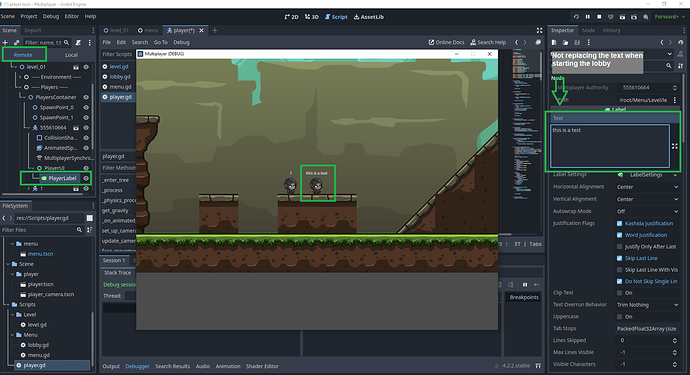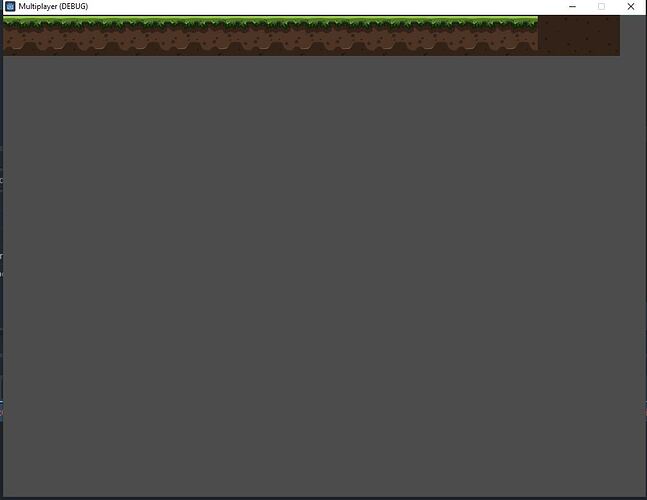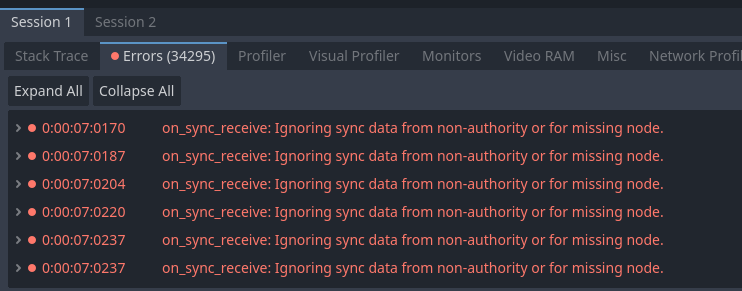Hello, I am taking the Godot 4 Multiplayer: Make your Own Online Game course. I have got through Section 3: Muliplayer Connection up to lecture 22: Authority.
End Goal
My end goal is when the game starts. I want my players who spawn in the game to have their names changed and display correctly for both the host and the client. For right now in my code I have it set it to display the id of the player connected.
Problem
The name change only happens for the host, not the client. When looking on the client app, it does however sync the name change correctly. The code I am specifically trying to work is in the add_player function that is called in the _ready function.
additional comments
I’m am new to using godot and multiplayer so I may not understand fully if the code is just client or server side code for the level.gd script. I can instantiate the player, set it position, set the name of the node correctly, but not change the label.text . It looks like my synchronizers are set up correctly. If I run the game I can edit the text through the inspector and it updates for the client and the host correctly. Any help will be much appreciate it, thank you.
MultiplayerSynchronizer
playerlabel export when running
level.gd
extends Node2D
@export var player_container: Node2D
@export var player: PackedScene
@export var spawn_points: Array[Node2D]
var next_spawn_point_index = 0
func _ready():
if not multiplayer.is_server():
return
multiplayer.peer_disconnected.connect(delete_player)
for id in multiplayer.get_peers():
add_player(id)
add_player(1)
func _exit_tree():
if multiplayer.multiplayer_peer == null:
return
if not multiplayer.is_server():
return
multiplayer.peer_disconnected.disconnect(delete_player)
func add_player(id):
var player_instance = player.instantiate()
player_instance.position = get_spawn_point()
player_instance.name = str(id)
player_instance.player_label.text = player_instance.name
print(player_instance.player_label.text)
player_container.add_child(player_instance)
func delete_player(id):
if not player_container.has_node(str(id)):
return
player_container.get_node(str(id)).queue_free()
func get_spawn_point():
var spawn_point = spawn_points[next_spawn_point_index].position
next_spawn_point_index += 1
if next_spawn_point_index >= len(spawn_points):
next_spawn_point_index = 0
return spawn_point
player.gd
extends CharacterBody2D
var owner_id = 1
var players_connected = 1
@export_category("Movement Speed")
@export var move_speed : float = 200
@export_category("Jumping")
@export var max_jumps: int
@export var jump_count: int
@export var jump_height: float
@export var jump_time_to_peek: float
@export var jump_time_to_descent: float
@export_category("Player Setup")
@export var animated_sprite: AnimatedSprite2D
@export var player_camera: PackedScene
@export var camera_instance: Node
@export var camera_height: float = 132
@export var player_label: Label
@onready var jump_velocity : float = ((2.0 * jump_height) / jump_time_to_peek) * -1.0
@onready var jump_gravity : float = ((-2.0 * jump_height) / (jump_time_to_peek * jump_time_to_peek)) * -1.0
@onready var fall_gravity : float = ((-2.0 * jump_height) / (jump_time_to_descent * jump_time_to_descent)) * -1.0
@onready var init_sprite_scale = animated_sprite.scale
func _enter_tree():
owner_id = name.to_int()
set_multiplayer_authority(owner_id)
if owner_id != multiplayer.get_unique_id():
return
set_up_camera()
func _process(_delta):
if multiplayer.multiplayer_peer == null:
return
if owner_id != multiplayer.get_unique_id():
return
update_camera_position()
func _physics_process(delta):
# movement
if owner_id != multiplayer.get_unique_id():
return
var direction : float = get_movement_direction()
face_movement_direction(direction)
handle_movement_state(direction)
#set gravity
apply_gravity(delta)
move_and_slide()
func get_gravity() -> float:
return jump_gravity if velocity.y < 0 else fall_gravity
func _on_animated_sprite_2d_animation_finished():
animated_sprite.play("jump")
func set_up_camera():
camera_instance = player_camera.instantiate()
camera_instance.global_position.y = camera_height
get_tree().current_scene.add_child.call_deferred(camera_instance)
func update_camera_position():
camera_instance.global_position= global_position
func face_movement_direction(direction: float):
if not is_zero_approx(direction):
if direction < 0:
animated_sprite.scale = Vector2(-init_sprite_scale.x, init_sprite_scale.y)
else:
animated_sprite.scale = init_sprite_scale
func handle_movement_state(direction: float):
var is_falling = velocity.y > 0 and not is_on_floor()
var is_jumping = Input.is_action_just_pressed("jump") and is_on_floor()
var is_double_jumping = Input.is_action_just_pressed("jump") and is_falling
var is_jump_cancelled = Input.is_action_just_released("jump") and velocity.y < 0
var is_idle = is_on_floor() and is_zero_approx(velocity.x)
var is_walking = is_on_floor() and not is_zero_approx(velocity.x)
#Apply movement
velocity.x = direction * move_speed
#Animations
if is_jumping:
animated_sprite.play("jump_start")
elif is_double_jumping:
animated_sprite.play("double_jump_start")
elif is_walking:
animated_sprite.play("walk")
elif is_falling:
animated_sprite.play("fall")
elif is_idle:
animated_sprite.play("idle")
#Jumping
if is_jumping:
jump_count += 1
velocity.y = jump_velocity
elif is_double_jumping:
if jump_count < max_jumps:
jump_count += 1
velocity.y = jump_velocity
elif is_jump_cancelled:
velocity.y *= 0.5
elif is_on_floor():
jump_count = 0
func get_movement_direction() -> float:
var direction = (
Input.get_action_strength("move_right")
- Input.get_action_strength("move_left")
)
return direction
func apply_gravity(delta):
velocity.y += get_gravity() * delta



 I just don’t know what to do.
I just don’t know what to do.


